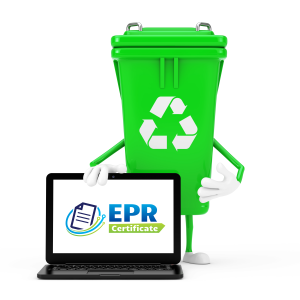
At EPRCertificate.Online, we are committed to delivering exceptional assistance for EPR certification with full transparency. Our proactive approach ensures that we invest sustained efforts to expedite the certification process.
Don’t hesitate to reach out to us to learn more about obtaining your EPR certificate.
Is an EPR certificate mandatory in India?
In India, electronic waste management regulations require all electronics producers, manufacturers, and importers to obtain an EPR authorization from the Central Pollution Control Board. This certification is mandatory and outlines the organization’s responsibilities for managing their electronic waste in compliance with the regulations.
What is an EPR Certificate?
Electronic Product Recycling (EPR) is a concept that has been adopted globally to help mitigate the negative environmental impacts of electronic waste. It places the responsibility for recycling and disposal of electronic products on the manufacturers and importers of such products, rather than on the consumer or local government.
An EPR certificate is a document that confirms that a company or organization has successfully met the requirements for EPR compliance. It serves as proof that the company has taken responsibility for the environmental impact of their products and has implemented measures to manage the electronic waste generated from their operations.
Obtaining an EPR certificate requires thorough documentation of the company’s e-waste management practices, including measures taken to reduce the environmental impact of their products, plans for disposal and recycling of end-of-life products, and reports of their compliance with local laws and regulations.
At EPRCertificate.Online, we guarantee to provide full assistance for companies seeking EPR certification. We prioritize transparency and action-oriented efforts to ensure a streamlined process for achieving EPR compliance. If you want to learn more about how to obtain an EPR certificate, don’t hesitate to contact us today.
What are the Benefits of Obtaining an EPR Certificate?
The EPR certificate, which stands for Extended Producer Responsibility, is required by Indian manufacturers and importers of products to effectively manage E-waste. The Central Pollution Control Board (CPCB) under the Government of India’s Ministry of Environment, Forest and Climate Change (MoEFCC) issues the EPR Authorization.
Procuring the EPR certificate is mandatory for manufacturers and importers to maintain control over E-waste. Failure to obtain the certificate would result in being unable to conduct business in India. In addition, manufacturers and importers who fail to acquire Extended Producer Responsibility authorization may face debarment, fines, or both.

Encouraging the Reuse of Products
Promoting the reuse of products reduces waste, conserves resources, saves money, and supports local businesses.
The Positive Environmental Impact
Positive environmental impact refers to human activities that promote sustainability and conservation efforts to reduce pollution and preserve natural resources.
Sustainable Development
Sustainable development balances economic growth, social responsibility, and environmental protection to meet present needs without compromising future generations' ability to meet their own needs.
Required Documents for EPR Certification

Step 1 : Identify the regulatory body.
Identify the regulatory body responsible for EPR certification in your region or country. This information can be found on their website or by contacting the relevant government agency.
Step 2 : Review the EPR requirements.
Review the EPR requirements for your product category and understand the specific documentation requirements. This may include information on the types and quantities of waste generated, waste management strategies, and reporting procedures.
Step 3 : Gather the necessary documents.
Gather all necessary documents to demonstrate compliance with EPR regulations, including waste management plans, waste audit reports, and performance data. It may also include legal and financial documents, as required by the regulatory body.
Step 4 : Submit the documents for certification.
Submit the necessary documents to the regulatory body responsible for EPR certification for review and evaluation. Upon successful review and evaluation, the regulatory body will issue the EPR certification.
We provide assistance in the documentation and evaluation process.
We provide assistance in the documentation and evaluation process.
Our EPR certificate agents are equipped with the necessary resources to track your application.
Our agents are equipped with the necessary resources to track your application and coordinate directly with CPCB officials for proper follow-ups and acknowledgments.
We invest sustained efforts to address any queries or demands raised by CPCB.
We strive to meet your expectations by completing all required formalities.
As the finest EPR certificate consultants, we offer the most acceptable solutions to all your queries regarding EPR authorization certificates.
If you have any concerns regarding EPR certification or online registration, we assure you that we will provide the finest solutions in EPR registration.
The EPR authorization certificate is crucial for society, consumers, manufacturers, and importers as it promotes safety, reduces wastage, encourages sustainable development, and promotes the reuse of products.
Moreover, it is mandatory to acquire the EPR certificate to operate in the Indian market.
To ensure a smooth and hassle-free process of obtaining an EPR authorization certificate, our experienced EPR consultant team is available to guide you. We guarantee accuracy and strive to avoid any inaccuracies.
Therefore, for expert and professional services, please contact us immediately.
Frequently Asked Questions
-
What is Extended Producers Responsibility?
Extended Producer Responsibility (EPR) is a responsibility given to producers, manufacturers, and importers for environmentally sound disposal/recycling of post-consumer waste under The Plastic Waste Management Rules, 2016.
-
Extended Producers Responsibility Implementation Process
The first step is to register with the CPCB/SPCB by submitting the necessary documents, which include an action plan, agreement, certificates, licences, and so on.
The following phase is an authorised waste management agency collecting the agreed volume of post-consumer plastic waste from the intended location over a one-year period and recycling or disposing of it securely in accordance with CPCB/SPCB norms.
The waste collection agency will give evidence of waste collection operations in the form of appropriate papers.
A quarterly report will be submitted to CPCB on behalf of PIBOM’s.
The agency will submit a final report to PIBOM after the activity is completed. -
Methods of Waste Disposal under EPR
Waste collected under the EPR is transported to the nearest disposal or recycling facility and processed through one of the following methods.
Used as fuel in Cement Kiln.
WTE Recovery,
Recycling. -
What is multi-layered plastic waste?
Multi-layer Plastic Waste is a type of plastic waste that has multiple layers of plastic, such as packaging chips. (There are numerous layers of plastic and aluminium used for packaging.
-
Is it Possible to Recycle Multi-Layered Plastic?
Yes,! WE recycle multilayered post-consumer plastic waste into PCR Granules, which may then be utilised to make a variety of recycled products.
